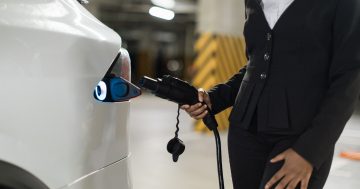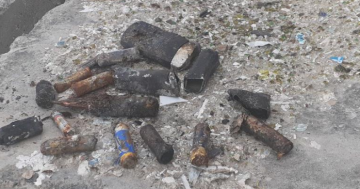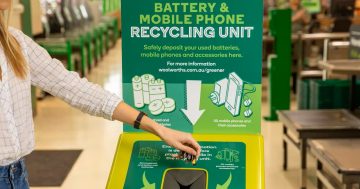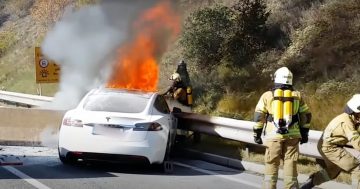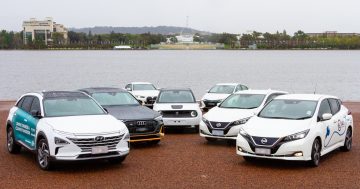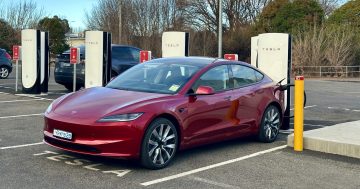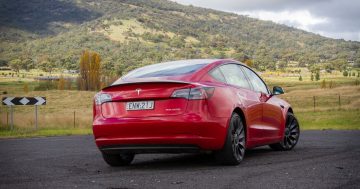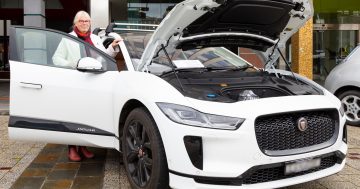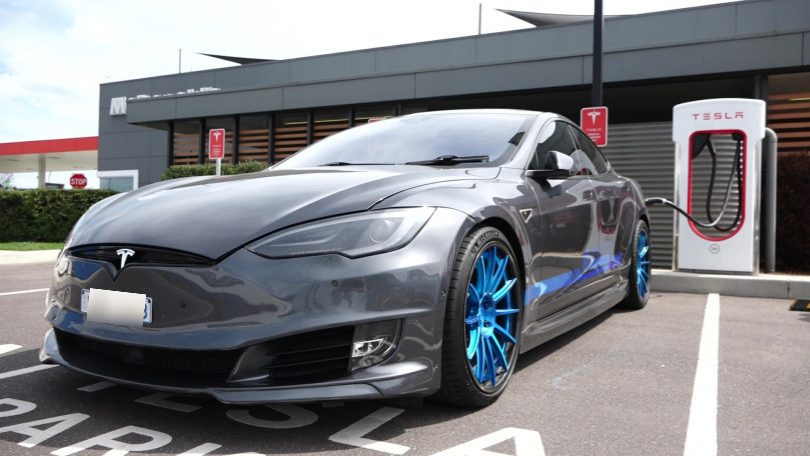
A Tesla Model S charging at Majura Park. What will happen to its battery at end-of-life? Photo: James Coleman.
The ACT’s environmentally aware – and wealthy – motorists are leading the way towards zero-emissions transport, embracing electric vehicles and the clean-driving benefits they offer.
What’s often overlooked is what happens to the batteries, which are increasing in size and power, when their job is done.
New research from the University of Technology Sydney (UTS) suggests 30,000 tonnes of EV batteries will reach their end-of-life in Australia as soon as 2030, and this number is forecast to surge to 360,000 tonnes by 2040 and 1.6 million tonnes by 2050.
That’s a lot of batteries that could end up in landfill with the threat of toxic chemicals leaching into the soil and waterways.
There is also the fire risk. A household lithium battery sparked the disastrous blaze at the Hume recycling facility. With the projected number of vehicle batteries entering the waste stream, that risk will only increase.
Like all new industries, developing systems to manage the downsides seems to take a while.
In fact, for many, we have sleepwalked into the future and worried about the consequences and the clean-up afterwards.
The Battery Stewardship Council (BSC), the government-backed body set up to plan for battery waste in Australia, doesn’t want that to happen and is calling for action now.
The hope is that, eventually, a circular economy can be established, and batteries can be recycled and reused. The CSIRO believes this has the potential to be a $30 billion industry by 2036.
But that road is not necessarily easy – look at the problems with current waste management and recycling goals.
The ACT Government advises that EV batteries should be recycled and transported by specialist recyclers, and owners should discuss safe disposal options with their auto electrician or dealership.
Obviously, a more substantial and structured system will need to be in place when EVs become the norm, not the novel.
Companies are recycling batteries in Australia to recover lithium, cobalt and nickel, all of which can be reused in making new batteries.
But only about 6 per cent of batteries are dealt with this way, according to ActewAGL.
The car-makers and battery manufacturers who stand to make fortunes from the transport revolution will need to be part of the solution and accept their responsibilities, although it seems few have any concrete plans yet for dealing with the growing challenge.
Self-regulation has rarely worked anyway and government will have to ensure that in the process of cutting emissions, we don’t create another environmental monster.
A National Battery Strategy being developed by the federal Department of Industry, Science and Resources is due for release later this year. It will need to set clear guideposts for industry.
The introduction of more stringent fuel efficiency standards will pave the way for more EV brands and makes with batteries offering more and more range to enter the Australian market, reducing prices and offering more choice to meet the demand that is already there.
The transport system is transitioning and nothing will hold that back.
But the issues of battery provenance and disposal will need to be addressed.
The sceptics will use the environmental challenges of EVs – like those of solar panels – to try to debunk the need to move away from the internal combustion engine.
But these are overwhelmed by the global oil and petrochemical industry’s pollution record and its climate-changing emissions.
The waste issue is a big one. We just need to tackle it front on.












